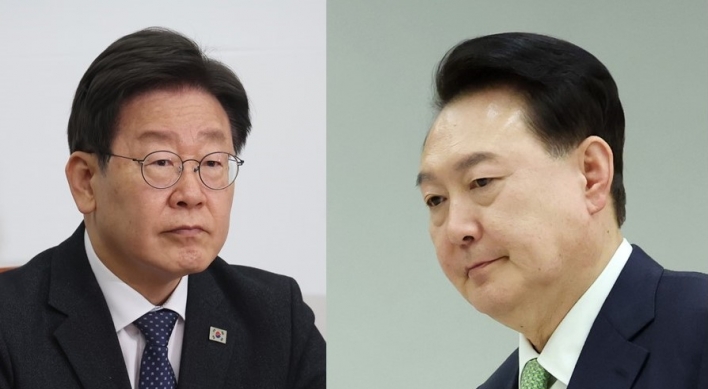Even today, Africa is a continent often judged through a prism of harsh stereotypes. That makes the longevity of South African freedom all the more meaningful as the country marks the 20th anniversary of its democracy this year, according to its top diplomat here.
South Africa commemorates freedom and democracy on its National Day, called Freedom Day, which takes place on April 27.
“The idea of freedom, 20 years of freedom ― you know, I voted for the first time in 1994 ― is a real, real thing,” said South African Ambassador to South Korea Hilton Dennis in an interview with The Korea Herald at his office in Hannam-dong, Seoul, Tuesday. “People’s dignity, lost for hundreds of years, was finally retrieved. The fact is they have rights and those rights are largely protected. People have benefited and their lives have improved.”
The embassy organized a series of events to mark the first two decades of the new South Africa, including a series of ambassadorial interviews with local media outlets and a Freedom Day reception on Friday.
South Africa commemorates freedom and democracy on its National Day, called Freedom Day, which takes place on April 27.
“The idea of freedom, 20 years of freedom ― you know, I voted for the first time in 1994 ― is a real, real thing,” said South African Ambassador to South Korea Hilton Dennis in an interview with The Korea Herald at his office in Hannam-dong, Seoul, Tuesday. “People’s dignity, lost for hundreds of years, was finally retrieved. The fact is they have rights and those rights are largely protected. People have benefited and their lives have improved.”
The embassy organized a series of events to mark the first two decades of the new South Africa, including a series of ambassadorial interviews with local media outlets and a Freedom Day reception on Friday.

“Our main message is that the transformation of South African society has been real for us as South Africans,” Dennis said. “If you had 20 years of what we call ‘freedom and democracy,’ in a society in which there were such inequalities, then it is worth celebrating ― you would want to celebrate that.”
Dennis said that the milestone should have relevance throughout the continent and beyond as proof that genuine democratic governance can work in Africa.
The biggest impact on the African region of the 20 year anniversary of South African democracy is its longevity, he said. “Africa is unfortunately still synonymous with unconstitutional changes of government. South Africa represents a success case (and serves as a model) of democracy. ... That is the positive role that our experience can play in Africa.”
He pointed out how 20 years of real democracy in South Africa has brought material benefits to ordinary South Africans. Some statistics bear out this claim.
South African democratization has improved socioeconomic conditions. Access to electricity rose from 51 percent in 1994 to 80 percent in 2013; access to clean sanitation 50 percent to 84 percent; access to potable water grew from 63 percent to 93 percent.
South Africa has become a so-called middle-income country with per capita GDP reaching about $11,000.
“All these indicators showing an improvement in the quality of people’s lives, these things are real. They are not illusions, and therefore worthy of celebrating,” he said.
Democratization in South Africa parallels South Korea’s political development somewhat as well.
In December 1992, South Koreans elected their first civilian president after more than 30 years of authoritarian regimes. Little over a year later, Nobel Peace Prize laureate Nelson Mandela became South Africa’s first democratically elected leader.
South Korea and South Africa both initiated a careful transition to democracy at about the same time. Perhaps sensing their shared position in the world, the two nations established diplomatic ties in December 1992, the year Kim Young-sam was elected president.
South Korea looks to Africa as a source for badly needed raw materials because it is a nation with few natural resources of its own. South Africa’s major exports to Korea are minerals such as rhodium, platinum, manganese, bronze, aluminum and ferrochromium, all major components in the production of stainless steel. South Korea is one of the largest steelmakers in the world.
South Korea exports cars and vehicle components, diesel fuel, cellphones and construction equipment to South Africa. Two-way trade reached $5.4 billion in 2011, according to the Korean Embassy in South Africa.
Economic ties could expand into energy this year. South Africa is keen to boost its use of nuclear-generated electricity over the coming years, according to the country’s Integrated Resource Plan of 2011, which outlined medium- and long-term electricity generation goals.
The South African IRP plan aims to raise its nuclear capacity by 9.6 gigawatts by 2023 with the construction of six to eight new plants. That would expand the share of nuclear power in South Africa’s electricity production sevenfold in two decades from the current 5 percent to 35 percent.
Dennis said that he plans to retire after his posting in South Korea winds down, which he expects to happen by the end of this year. After he returns to his home in South Africa, he said he wants to spend more time with his three children and his grandchildren, and to write books.
By Philip Iglauer (ephilip2011@heraldcorp.com)
-
Articles by Korea Herald







![[KH Explains] No more 'Michael' at Kakao Games](http://res.heraldm.com/phpwas/restmb_idxmake.php?idx=644&simg=/content/image/2024/04/28/20240428050183_0.jpg&u=20240428180321)


![[Weekender] How DDP emerged as an icon of Seoul](http://res.heraldm.com/phpwas/restmb_idxmake.php?idx=644&simg=/content/image/2024/04/25/20240425050915_0.jpg&u=)







![[Herald Interview] Mistakes turn into blessings in street performance, director says](http://res.heraldm.com/phpwas/restmb_idxmake.php?idx=652&simg=/content/image/2024/04/28/20240428050150_0.jpg&u=20240428174656)
